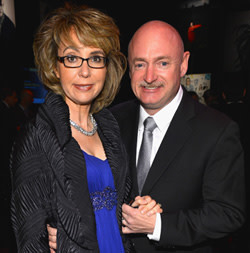Gabrielle Giffords

Roula Khalaf, Editor of the FT, selects her favourite stories in this weekly newsletter.
When she was a child, Gabrielle Giffords played the title role of Annie in a production of the musical in her home town of Tucson, Arizona. It tells the story of an American orphan girl who doesn’t let hard times get her down, and whoever made the casting decisions in Tucson had a good sense of character. There is a lot of Annie in the woman everyone calls Gabby.
Giffords has known adversity. On January 8 2011, she was meeting constituents of her US congressional district outside a supermarket in Tucson when a young man named Jared Loughner opened fire with a 9mm Glock semi-automatic pistol. A bullet ripped through Giffords’ brain, and some of the early news reports – including one that reached her husband, the astronaut Mark Kelly – said she was dead.
Six people were killed. But Giffords survived – and she has been soldiering on ever since. Despite giving up her seat in the House of Representatives the year after the shooting, she and her husband have emerged as leading campaigners for tougher gun control.

On a late autumn day, Giffords, 43, and Kelly, 49, are in New York to accept an award from Glamour magazine as “couple of the year” and to brief reporters on the activities of their lobbying group, Americans for Responsible Solutions.
It isn’t easy for Giffords. She walks with a limp and she struggles to speak more than a word or two at a time when we meet. Kelly does nearly all the talking while the professional politician at his side sits and listens, understanding enough of what is going on to offer a relevant phrase here or there but unable to manage much more. During nearly an hour of conversation, she completes only a handful of sentences.
Yet to meet Giffords is to be reminded that the sun will come out tomorrow – just as Annie said it would in the musical’s most show-stopping moment. Because for all her difficulty talking and her suffering, Giffords, like Annie, can sing.
It seems miraculous at first. But the former congresswoman’s abilities can be explained by the path of the bullet that was fired into her head. It remained on the left side of her brain, which is generally the province of speech. The right hemisphere, where musical abilities are thought to reside, was spared. Kelly says that she began doing what is known as music therapy only weeks after the shooting, singing in the hope that the right side of her brain could be trained to “do some of the stuff (her) left side of the brain used to do”.
Giffords shows off her musical chops by belting out the first three lines of a song from Annie called “Maybe” and an encore follows. She and her husband combine on what could serve as their theme song – a number performed by the girls at Annie’s orphanage (which was also sampled a few years back by the rapper Jay Z for what he called a “ghetto anthem”).
“It’s the hard-knock life,” Kelly begins slowly, demonstrating that the ability to carry a tune isn’t one of the requirements for service as a US astronaut. “For us,” Giffords chimes in, her pitch more precise than her husband’s and her voice strong and clear as she continues on her own. “It’s the hard-knock life – for us.”
The song’s use of the first person plural is particularly fitting under the circumstances. This couple has become one in ways that would have been hard to imagine when they began their relationship. It was once perhaps the ultimate commuter marriage. They met in 2003 when they travelled to China as part of a delegation of “young leaders” and they were almost literally living in different worlds when they were married four years later. She represented a district covering some 9,000 square miles of southeast Arizona. He was an astronaut based in Houston, Texas, with two daughters there from a first marriage that had ended in divorce. At any given time, she could be visiting US troops in a war zone such as Iraq or Afghanistan and he could be in space.
All that changed with the shooting. “Now, we live in the same house,” says Kelly. “There is a positive thing that comes out of anything. We get to live together.”
Their days are spent working on Giffords’ recovery (yoga and a treadmill are also parts of her routine) and performing what Kelly says is now “a full-time part-time job for both of us” – their work on gun control. “It’s a continuous thing,” he says. “She laughs about how I have to do the calls.”
For an ostensible novice, Kelly, who retired as an astronaut in 2011 to help take care of his wife, seems to have the right stuff for his new mission. He speaks in the modulated tones of mission control and he clearly knows his way around Earth. Asked if it was tough to grow up with both his parents serving on the police force of his home town of West Orange, New Jersey, he points out that a young man with those local connections could get away with a little more than the next fellow.
The couple’s campaign is based on the notion that they have a lot in common with Americans who cherish their constitutional right to bear arms. Both Giffords and Kelly are gun-control advocates who like guns – and own several of them. A recent report on CNN featured Giffords and her mother cheering Kelly as he fired a 9mm Glock – like Loughner’s – at targets such as plant pots and water bottles in the Arizona desert.

All the pair is demanding is that background checks on gun buyers should be tightened in order to stop the next Loughner, who is serving a life term in prison after pleading guilty to murder. He is a “sick man”, Giffords says starkly. He was suspended from college for bizarre behaviour and told not to return until he received a mental-health clearance. He was arrested on a drug charge. But he passed an FBI check for gun buyers – and Giffords and Kelly don’t think that is right.
“Responsible people should be allowed to buy as many guns as they want,” says Kelly. “We are in no way trying to prevent that or change that. But they should also have a background check before they buy a gun to make sure they are not some knucklehead or some convicted felon, or a domestic abuser, or somebody who had been adjudicated mentally ill.”
They face steep odds. The power of the National Rifle Association, the gun lobby, was demonstrated again just last April. Only months after another troubled young man, Adam Lanza, shot and killed 20 children at the Sandy Hook Elementary School in Newtown, Connecticut in December last year, the Democratic-controlled Senate rejected a bill to expand background checks for gun buyers. Giffords’ former colleagues in the Republican-controlled House of Representatives didn’t even bother to take up such sweeping legislation.
Yet despite the lack of action in Washington, Kelly believes there will be expanded checks in the future. “The leadership of the NRA doesn’t want it and they have a lot of influence but that is going to change,” he says. “This is a process. We are building a movement – an army of people who will advocate on behalf of this issue . . . and convince their representatives that now is the time to do this.”
Like his wife, he isn’t given to turning back. In his former life, he flew combat missions in Operation Desert Storm and served as the commander of the space shuttle. Now, he has the faith of a man who thought his wife was dead and learnt she was alive – then worried if she would ever speak again and heard her sing.
He admits to having had doubts. He initially didn’t know what to make of talk about people with certain kinds of brain injuries being able to sing. But about three weeks after Giffords was wounded, he and his wife were lying in her hospital bed and he figured he would see for himself. So Kelly asked her to sing “American Pie”, one of the wordiest pop songs in history. Giffords was able to sing then – and returns to the song one more time as her husband recounts the story.
“Bye-bye, Miss American Pie. Drove my Chevy to the levee, but the levee was dry,” she sings. “And good ol’ boys were drinkin’ whisky and rye, singin’–”
At that point, Kelly interrupts his wife. The next words of the song are “this’ll be the day that I die”. But he stops her before she gets there – right before – to compliment her on her performance. He says nothing more about it but the message seems clear: just as the morning of January 8 2011 wasn’t the right time for that kind of talk, neither is this November afternoon. Tomorrow is just a day away.
Gary Silverman is the FT’s US deputy managing editor and US national editor
Comments